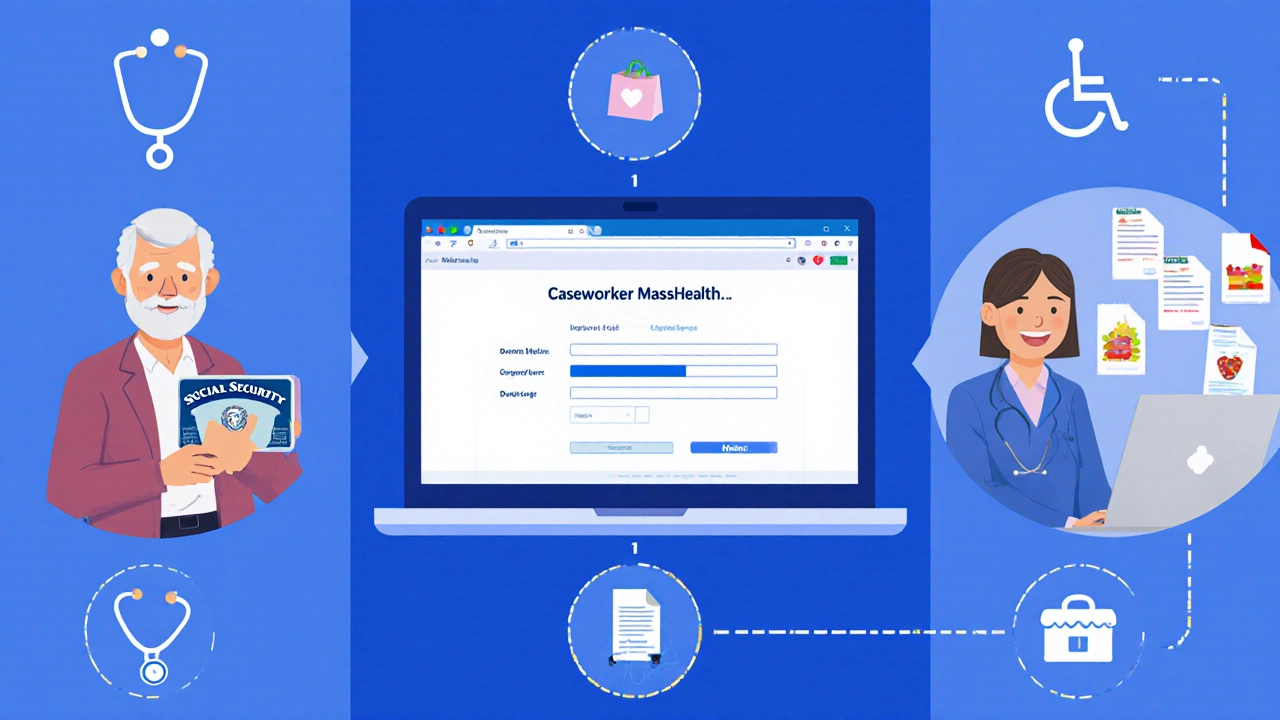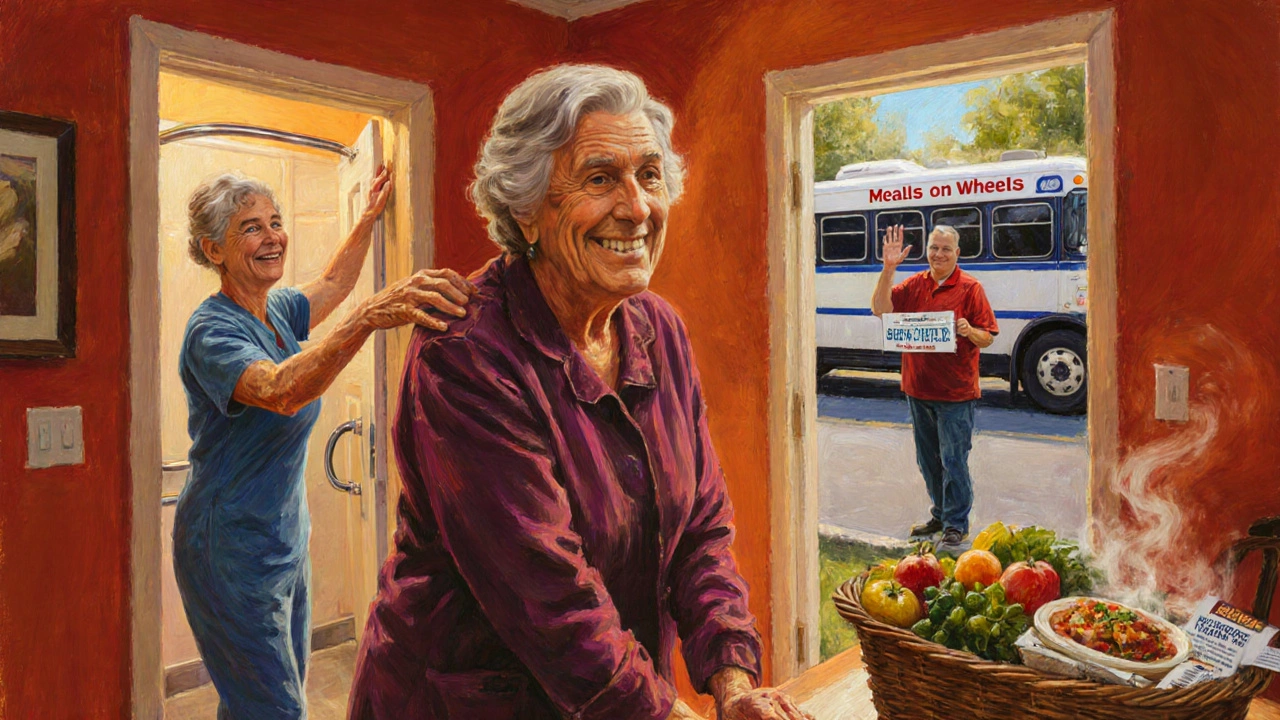Massachusetts Senior Assistance Eligibility Checker
Check Your Eligibility
Enter your details to see which Massachusetts senior assistance programs you might qualify for.
Eligibility Results
Finding the right help can feel overwhelming, especially when you’re trying to support an aging loved one. In Massachusetts the New England state known for its historic towns and strong community networks, there’s a full suite of Massachusetts elderly assistance programs designed to cover health, nutrition, transportation, and social connections. Below you’ll discover which services exist, who can use them, and exactly how to start the paperwork.
Quick Takeaways
- MassHealth and Medicaid provide medical coverage for low‑income seniors; eligibility starts at 100% of the federal poverty level.
- Meals on Wheels Massachusetts delivers hot meals to over 70,000 seniors each day, free for most qualifying households.
- The Department of Senior Services (DSS) runs the Commonwealth Coordinated Care (CCC) program, linking health, long‑term care, and community services.
- Area Agencies on Aging (AAAs) are your local go‑to for transportation, caregiver support, and Alzheimer’s programs.
- Veterans can tap into additional benefits through the VA’s Aid and Attendance pension and state‑specific programs.
Core State Agencies and Their Roles
Three state entities act as the backbone for senior support:
- Department of Senior Services the lead agency overseeing senior policies, funding, and statewide programs
- MassHealth Massachusetts’ Medicaid program, offering low‑cost health coverage to eligible seniors
- Area Agency on Aging regional offices that connect seniors with local services like meals, transportation, and caregiver training
Understanding which agency handles what can save you hours of calls. Usually, you’ll start with the AAA in your county, then move to DSS or MassHealth for health‑related benefits.
Major Assistance Programs Overview
Below is a snapshot of the most widely used programs. The table highlights the primary service, basic eligibility criteria, and the best way to apply.
| Program | Primary Service | Typical Eligibility | How to Apply |
|---|---|---|---|
| MassHealth (Standard & Senior Care) | Comprehensive medical coverage, prescription drugs, dental, vision | Age65+, income ≤ 133% of FPL, assets ≤ $2,000 (unless on a community‑spouse resource exemption) | Online at MassHealth.org or call 1‑800‑841‑2900 |
| Meals on Wheels Massachusetts | Free or low‑cost hot meals delivered to home | 65+ or disabled, any income (means‑tested for reduced‑price meals) | Call your local AAA or 1‑800‑985‑6000 |
| Commonwealth Coordinated Care (CCC) | Integrated health, long‑term care, and social services | 65+, eligible for MassHealth, requires enrollment through a participating health plan | Contact your MassHealth plan or local DSS office |
| Transportation Assistance (MassRide, senior shuttles) | Door‑to‑door rides for medical appointments, grocery trips | 65+, income ≤ 200% of FPL, or medically frail regardless of income | Apply through your AAA; many services also accept Medicaid waivers |
| Veterans Aid & Attendance | Monthly stipend for in‑home care, plus health‑care premium assistance | U.S. veteran, meet income/asset limits, must have a service‑connected disability or need assistance with ADLs | File VA Form 21-534EZ or contact the Massachusetts VA Regional Office |

Step‑by‑Step: Enrolling in MassHealth
- Gather required documents: proof of age (driver’s license or birth certificate), Social Security number, recent pay stubs or benefit statements, and a list of assets.
- Visit MassHealth’s portal and create an account. The site walks you through a quick eligibility screener.
- Complete the application. If you have a community‑spouse, you may need to fill out a “spousal resource” worksheet.
- Upload documents or mail them to the address listed on the confirmation page.
- Within 30days, a caseworker will contact you for a brief interview. Answer questions honestly; many delays happen because of missing paperwork.
- Once approved, you’ll receive a MassHealth card and a welcome packet describing how to access doctors, pharmacies, and the CCC plan if you choose it.
Tip: If you hit a snag, call the MassHealth helpline and ask for a “concierge case manager.” They can fast‑track missing items.
Transportation Options Tailored for Seniors
Not every senior can drive, and parking can be a nightmare in Boston or Springfield. Massachusetts offers three main transportation tracks:
- MassRide - a statewide paratransit service that books rides up to 14 days in advance. Eligibility mirrors Medicaid’s non‑emergency medical transport criteria.
- Local Senior Shuttles - run by most AAAs; these are free or low‑cost loops that stop at senior centers, grocery stores, and hospitals.
- Volunteer Driver Programs - charitable groups like “Seniors on Wheels” match volunteers with seniors who need occasional rides. Usually no paperwork, just a simple registration.
To schedule a MassRide ride, call the statewide line at 1‑800‑555‑6091 and have your Medicaid ID handy. For local shuttles, check the AAA website for route maps and schedules.
Nutrition Support Beyond Meals on Wheels
While Meals on Wheels is the most visible food program, seniors can also tap into these resources:
- Senior Farmers Market Nutrition Program (SFMNP) - provides fresh, locally grown produce vouchers to eligible seniors.
- Commodity Supplemental Food Program (CSFP) - delivers monthly food packages that include canned goods, dairy, and protein items.
- Nutrition Education Workshops - offered at most senior centers, covering topics like “Cooking for Diabetes” and “Budget‑Friendly Meal Planning.”
Eligibility for SFMNP and CSFP mirrors the federal SNAP guidelines (income ≤ 130% of FPL). Sign up through your AAA or the state Department of Transitional Assistance.
Home‑Based Care and In‑Home Support Services
When everyday tasks become hard, Massachusetts provides a menu of in‑home services:
- Home Health Aide (HHA) Services - covered under MassHealth’s HCBS (Home and Community‑Based Services) waiver. HHAs help with bathing, dressing, medication reminders.
- Personal Care Attendant (PCA) Program - also part of the HCBS waiver, but focuses on housekeeping, meal preparation, and transportation.
- Home Modification Grants - the state’s “Home Safe” initiative provides up to $3,000 for wheelchair ramps, grab bars, and bathroom remodels.
To start, contact your local AAA’s “Aging Services” line. They will run a needs assessment, then submit the paperwork to MassHealth on your behalf.

Legal and Financial Planning Resources
Even the best services can’t replace solid planning. Massachusetts offers free or low‑cost counseling in these areas:
- Elder Law Clinics - law schools such as Harvard and UMass Amherst run quarterly clinics where seniors receive advice on power of attorney, guardianship, and advance directives.
- Benefits Counseling - the Department of Elder Affairs (DEA) runs “BenefitsCheckUp” sessions to prevent over‑payments and loss of eligibility.
- Tax Preparation Help - the Volunteer Income Tax Assistance (VITA) program offers free filing for seniors earning under $57,000.
Schedule a session by calling the DEA at 1‑877‑531‑0372 or emailing [email protected].
Putting It All Together: A Sample Action Plan
Imagine Mary, 78, living alone in Worcester. She’s on a modest pension, has a mild mobility issue, and worries about groceries.
- Mary calls the Worcester Area Agency on Aging. They confirm she qualifies for Meals on Wheels and the SFMNP vouchers.
- Next, she applies for MassHealth using the online portal; after a short interview, she’s approved for the HCBS waiver.
- Through the HCBS waiver, Mary receives two hours of weekly home‑health aide support, plus a grant for a grab bar in her bathroom.
- She registers for the local senior shuttle, which takes her to the grocery store every Tuesday.
- Finally, Mary attends a free legal clinic to set up a durable power of attorney, ensuring her wishes are documented.
Within a month, Mary’s quality of life improves dramatically, and her family feels reassured.
Frequently Asked Questions
What income level qualifies for MassHealth senior plans?
For individuals age65+, the threshold is 133% of the federal poverty level (about $19,000 yearly in 2025). Those with higher income may still qualify for the Partial‑Premium MassHealth plan, which requires a modest monthly contribution.
Can I receive both Meals on Wheels and the Senior Farmers Market vouchers?
Yes. The programs are funded separately, so receiving one does not disqualify you from the other. In fact, many seniors use both to ensure a balanced diet.
How do I know which Area Agency on Aging serves my town?
Visit the Mass.gov senior services page and enter your ZIP code, or call the state hotline at 1‑800‑555‑1234. The system will route you to the correct AAA office.
Do veterans receive extra benefits beyond the VA Aid & Attendance?
Massachusetts offers the Veterans’ Supplemental Income (VSI) program, which can supplement VA pensions and provide additional home‑care subsidies. Eligibility mirrors the VA’s requirements but adds a state‑level income test.
What if I’m over the asset limit for MassHealth but own my home?
Massachusetts applies a “community‑spouse resource exemption,” meaning the primary applicant’s home can be excluded if a spouse lives there and meets certain income thresholds. A qualified caseworker can walk you through the calculation.
Next Steps & Troubleshooting
Below are quick actions you can take depending on where you are in the process:
- Just starting? Call your local AAA (usually a toll‑free 1‑800 number) and ask for a “Senior Services Intake.”
- Application stalled? Use the MassHealth “Check My Application” portal to see missing documents, then upload them immediately.
- Transportation gaps? Register for a volunteer driver service while you wait for MassRide approval; many volunteers accept cashless tips.
- Nutrition concerns? Ask the AAA about the SFMNP voucher program - it’s free and often overlooked.
Remember, most hurdles are paperwork‑related, not eligibility‑related. Keep a dedicated folder for all documents, and don’t hesitate to ask a caseworker to repeat instructions - they’re used to it.
